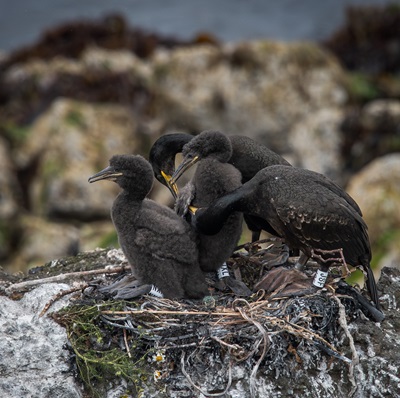New study led by Edinburgh Napier University shows how rough conditions affect faithfulness
 Wild seabirds are more likely to split up in windy weather, according to a newly published study led by Edinburgh Napier University (ENU).
Wild seabirds are more likely to split up in windy weather, according to a newly published study led by Edinburgh Napier University (ENU).
The paper, published in the journal Animal Behaviour today reveals that environmental conditions before the breeding season appear to have an impact on mate faithfulness – whether birds reunite with the same partner to breed each year, or ‘divorce’ to form a different pair.
Researchers from ENU, the UK Centre for Ecology & Hydrology (UKCEH), and Biomathematics and Statistics Scotland (BioSS) analysed data collected over the course of two decades from more than 1,500 birds on the Isle of May National Nature Reserve, in the Firth of Forth, and compared them with late winter weather records to understand their breeding habits.
The study focused on European shags (Gulosus aristotelis), given their long lifespan and tendency to change partners between breeding seasons. While the birds analysed for this study had a fidelity rate of 45%, this varied markedly from year to year.
Although age and previous breeding success have been established as strong predictors of mate faithfulness, this paper demonstrates how weather conditions in the lead up to the breeding season are also a significant factor affecting seabird mating habits. Out of the weather conditions analysed, wind speeds had the strongest effect on whether couples stayed together.
Importantly, birds that remained with the same partner tended to lay eggs earlier, which is strongly tied to how many chicks they rear.
The findings are significant given that climate change is bringing about warmer and windier weather conditions.
Ecologists are now calling for further investigation into how shifting environmental conditions could disrupt social relationships among wildlife.
Lead researcher Dr Sue Lewis, from ENU’s Centre for Conservation and Restoration Science, said: "We found that late winter weather is likely critical for pair bonding.
"It is a time when adults are returning to colonies and preparing to breed. When conditions are tough – particularly when it’s windier – it appears that ‘divorces’ are more frequent.
“Until now, the effects of pre breeding weather conditions on faithfulness have been largely under-appreciated. Our study suggests that it warrants further consideration.”
Co-researcher Professor Francis Daunt, from the UK Centre for Ecology & Hydrology, said: “This study is one of the few to test how changing environments influence social behaviours in wildlife.
“It is excellent to see our long-term data used to tackle these important questions, given the current concerns about the impacts of future climate change.”
Picture credits: Header - Richard Barlett. Main article - Ken Ritchie